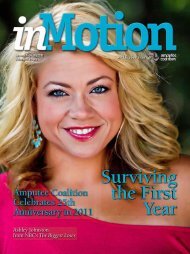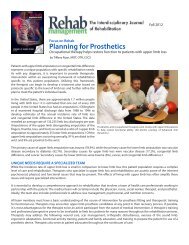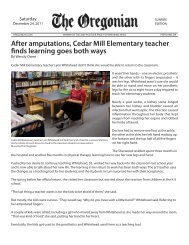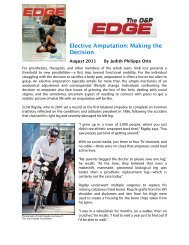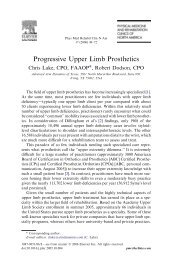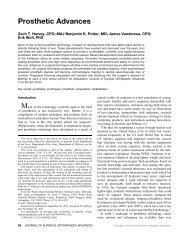Therapeutic Influences on the Upper-Limb Amputee - Advanced Arm ...
Therapeutic Influences on the Upper-Limb Amputee - Advanced Arm ...
Therapeutic Influences on the Upper-Limb Amputee - Advanced Arm ...
Create successful ePaper yourself
Turn your PDF publications into a flip-book with our unique Google optimized e-Paper software.
ilitative process. A l<strong>on</strong>gitudinal study with a large sample size<br />
in proporti<strong>on</strong> to <strong>the</strong> overall number of upper-limb amputees is<br />
proposed to fur<strong>the</strong>r identify <strong>the</strong> specific issues. Specific questi<strong>on</strong>s<br />
need to address functi<strong>on</strong>ality and day-to-day issues impacted<br />
by <strong>the</strong> loss of an arm and how this interplays with o<strong>the</strong>r<br />
issues such as body image, perceived stigma, and acceptance.<br />
Particular attenti<strong>on</strong> also needs to be directed to evaluating bilateral<br />
upper-limb amputees in regard to any variati<strong>on</strong>s in how<br />
<strong>the</strong>se issues impact <strong>the</strong>m. Also needed is a thorough study of <strong>the</strong><br />
many levels of upper-limb amputati<strong>on</strong> from <strong>the</strong> loss of fingers<br />
to <strong>the</strong> shoulder disarticulati<strong>on</strong> level. Centered up<strong>on</strong> <strong>the</strong> results<br />
of <strong>the</strong> survey, a screening evaluati<strong>on</strong> tool to determine <strong>the</strong> coping<br />
and acceptance of upper-limb amputees would be helpful.<br />
Based up<strong>on</strong> <strong>the</strong> development and administrati<strong>on</strong> of this tool,<br />
upper-limb amputees can be referred to appropriate services as<br />
needed. Additi<strong>on</strong>al service models can be developed to address<br />
<strong>the</strong> identified needs where <strong>the</strong>y are not currently met. Opportunities<br />
to study <strong>the</strong> effect of addressing <strong>the</strong> psychosocial issues<br />
<strong>on</strong> pros<strong>the</strong>tic success would also be possible in future studies,<br />
in additi<strong>on</strong> to <strong>the</strong> role and specific coping issues of family members.<br />
This tool will be helpful for those professi<strong>on</strong>als who may<br />
not work exclusively with upper-limb amputees and who may<br />
o<strong>the</strong>rwise overlook <strong>the</strong> many ways in which an upper-limb loss<br />
impacts <strong>the</strong> individual. Though several studies have found that<br />
upper-limb patients have a higher rate of emoti<strong>on</strong>al disturbance,<br />
no evidence points to what specific issues would address <strong>the</strong><br />
emoti<strong>on</strong>al disturbance. In c<strong>on</strong>clusi<strong>on</strong>, <strong>the</strong>re are many opportunities<br />
to evaluate <strong>the</strong> specific needs of upper-limb amputees in<br />
order to best develop tools and resources for ultimate patient<br />
success. As new technologies and advancements in upper-limb<br />
pros<strong>the</strong>tic opti<strong>on</strong>s emerge, so must <strong>the</strong> support systems to enable<br />
and empower patients for success.<br />
References<br />
1. Dillingham, T.R.; Pezzin, L.E.; MacKenzie; E J.<br />
“<strong>Limb</strong> Amputati<strong>on</strong> and <strong>Limb</strong> Deficiency: Epidemiology<br />
and Recent Trends in <strong>the</strong> United States.”<br />
Sou<strong>the</strong>rn Medical Journal, 2002; 95: 875-83.<br />
2. Adams, P.F., et al. “Current Estimates from <strong>the</strong><br />
Nati<strong>on</strong>al Health Interview Survey,” 1996. Vital and<br />
Health Statistics 1999; 10:200.<br />
3. Nicholas, J.J.; Robins<strong>on</strong>, L.R.; Schulz, R.; et al.<br />
“Problems Experienced and Perceived by Pros<strong>the</strong>tic<br />
Patients.” Journal of Pros<strong>the</strong>tics and Orthotics 1993,<br />
5:16.<br />
4. Phelps, L.F.; Williams, R.M.; Raichle, K.A.; et al.<br />
“The Importance of Cognitive Processing Adjustment<br />
in <strong>the</strong> 1 st Year Following Amputati<strong>on</strong>.” Rehabilitati<strong>on</strong><br />
Psychology 2008, 53:28-38.<br />
5. Price, E.M.; Fisher, K. “How Does Counseling Help<br />
People with Amputati<strong>on</strong>?” Journal of Pros<strong>the</strong>tics<br />
and Orthotics 2002, 14:102.<br />
6. Price, E.M.; Fisher, K. “Additi<strong>on</strong>al Studies of <strong>the</strong><br />
Emoti<strong>on</strong>al Needs of <strong>Amputee</strong>s.” Journal of Pros<strong>the</strong>tics<br />
and Orthotics 2005, 17:52.<br />
7. Price, E.M.; Fisher, K. “Fur<strong>the</strong>r Study of <strong>the</strong> Emoti<strong>on</strong>al<br />
Needs of <strong>Amputee</strong>s.” Journal of Pros<strong>the</strong>tics<br />
and Orthotics 2007, 19:106.<br />
8. Gallagher, P.; MacLachlan, M. “Psychological<br />
Adjustment and Coping in Adults with Pros<strong>the</strong>tic<br />
<strong>Limb</strong>s.” Behavioral Medicine 1999, 25:117.<br />
9. Maguire, P.; Parkes, C.M. “Surgery and Loss of Body<br />
Parts.” BMJ 1998, 316:1086-1088.<br />
10. Anderss<strong>on</strong>, M.; Deighan, F. Coping Strategies in<br />
C<strong>on</strong>juncti<strong>on</strong> with Amputati<strong>on</strong>. Divisi<strong>on</strong> for Health<br />
and Caring Sciences, Karlstads University, 2006.<br />
11. Walters, J. “Coping with Leg Amputati<strong>on</strong>.” American<br />
Journal of Nursing 1981, 81:1349-1352.<br />
12. Rybarczyk, B.; Nyenhuis, D.L.; Nicholas, J.J.; et al.<br />
“Body Image, Perceived Social Stigma, and <strong>the</strong> Predicti<strong>on</strong><br />
of Psychosocial Adjustment to Leg Amputati<strong>on</strong>.”<br />
Rehabilitati<strong>on</strong> Psychology 1995, 40:95-110.<br />
13. Bosmans, J.C.; Suurmeijer, T.P.B.M.; Hulsink, M.; et<br />
al. “Amputati<strong>on</strong>, Phantom Pain and Subjective Wellbeing:<br />
A Qualitative Study.” Internati<strong>on</strong>al Journal of<br />
Rehabilitati<strong>on</strong> 2007, 30:1-8.<br />
14. Isken, T.; Ege, O.; Gucer, K.; et al. “A Preliminary<br />
Report: Evaluati<strong>on</strong> of <strong>the</strong> Psychiatric Status of<br />
Patients Who Had Underg<strong>on</strong>e Major Amputati<strong>on</strong><br />
because of High-voltage Electrical Burns.” Journal<br />
of Burn Care & Research 2007, 28:930.<br />
15. Mans<strong>on</strong>, M.P.; Devins, G.V. “Some Psychological<br />
Findings in <strong>the</strong> Rehabilitati<strong>on</strong> of <strong>Amputee</strong>s.” Journal<br />
of Clinical Psychology 2006, 9:65-66.<br />
16. Owsley, C.; McGwin, G.; Scilley, K.; et al. “Focus<br />
Groups with Pers<strong>on</strong>s Who Have Age-related Macular<br />
Degenerati<strong>on</strong>: Emoti<strong>on</strong>al Issues.” Psychological<br />
Aspects of Disability, 2006, 51:23-29.<br />
17. Fisher, E.B.; Thorpe, C.T.; DeVellis, B.M.; DeVellis,<br />
R.F. “Healthy Coping, Negative Emoti<strong>on</strong>s, and<br />
Diabetes Management: A Systematic Review and<br />
Appraisal.” The Diabetes Educator 2007, 33:1080.<br />
18. Wils<strong>on</strong>, S.; Engel, J.M.; Ciol, M.A.; Jensen, M.P.<br />
“Perceived Social Support, Psychological Adjustment,<br />
and Functi<strong>on</strong>al Ability in Youths with Physical<br />
Disabilities.” Rehabilitati<strong>on</strong> Psychology 2006,<br />
51:322-330.<br />
Ruth M. Morris, LMSW, is affiliated with <strong>Advanced</strong> <strong>Arm</strong> Dynamics Southwest<br />
Center of Excellence, Irving, Texas. Send<br />
corresp<strong>on</strong>dence to Ruth M. Morris, LMSW;<br />
3501 North Macarthur Boulevard, Suite<br />
650; Irving, TX 75062; e-mail: rmorris@<br />
armdynamics.com<br />
Supplement of The O&P EDGE June 2008 ■ The Academy TODAY A-7



